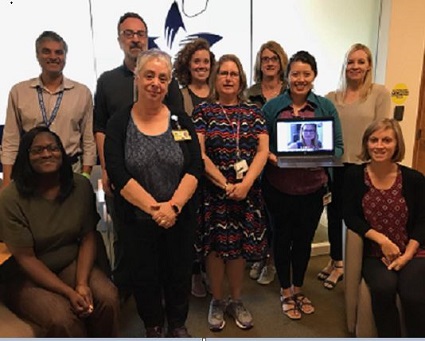ResCU II Project
ResCU II: Improving In-Hospital Cardiac Arrest Care and Discovering Keys to Super Survivorship
| Team Members: Jack Iwashyna, MD (Co-PI) Brahmajee Nallamothu, MD (Co-PI) Tim Hofer, MD Sanjay Saint, MD Paul Pfeiffer, MD Wyndy Wiitala, PhD Jenny Burns, MHSA Claire Seigworth, MPH Marylena Rouse, BSW Kaitlyn Luginbill, MPH Katrina Hauschildt, MA Ken Langa, MD Anne Sales, PhD Molly Harrod, PhD Lee Kamphuis, MPH Brenda Vincent, MPH Funding: 10/01/2018 –03/31/2022 |
 |
|
| Partners: VA National Simulation Network; VA Resuscitation Education Initiative; VA National Office for Cardiology, Critical Care Operations Group; VA Inpatient Evaluation Center; VA Office of Reporting, Analytics, Performance Improvement, and Deployment |
||
Background: In-hospital cardiac arrests (IHCA) are potentially devastating events that can lead to major complications and death. Improvement in IHCA care has been an important VA system-level priority for several years. In both the VA HSR&D-funded ResCU-I and NHLBI-funded HEROIC studies, our team found large variation in IHCA incidence and survival across US hospitals that are explained by gaps in care processes, including poor documentation of clinical care, and underutilization of best practices in IHCA care (i.e., simulation of “code blues” for practicing immediate response to cardiac arrests, and post-code debriefing). These deficits in implementing the fundamentals of IHCA care stymie both patient-level and system-level quality efforts. Yet, ResCU-1 also found some Veterans had remarkable recovery from IHCA, becoming “super-survivors” — but we do not know how the care of super-survivors differed.
Objectives: The objective of this study is to build on ResCU-I’s foundations to improve IHCA care in VA. In Aim 1, we will assess implementation of a new IHCA documentation template as a model for quality efforts. This will be accomplished by retrospective review of IHCA hospitalizations in the electronic medical records and multi-level statistical modeling. In Aim 2, we will develop and pilot new interventions to improve IHCA care, focusing on post-code debriefing, mock code simulation training, and code documentation. This will use video-site-visits to identify barriers and facilitators using established frameworks (CFIR and TDF), and then partner to pilot and implement interventions. In Aim 3, we will identify IHCA super-survivors and best practices associated with their care. This will include deep semi-structured interviews with super-survivors, their informal caregivers, and control patients of similar disability who did not recover after IHCA, and their VA clinicians to identify candidate practices that may contribute to super-survivorship. The association of those practices with super-survivorship will then be tested in a prospective cohort of IHCA survivors. All will be integrated to produce and disseminate with partners a ‘Code Blue Survivor Bundle’ to form the basis of further improvements in VA care of IHCA. 



















